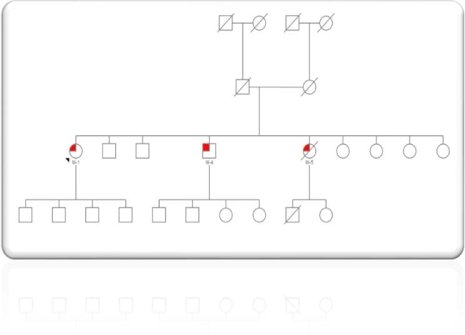Session Information
Date: Tuesday, June 21, 2016
Session Title: Genetics (NON-PD)
Session Time: 12:30pm-2:00pm
Location: Exhibit Hall located in Hall B, Level 2
Objective: To report the first Irish family with FTLD and a novel granulin (GRN) mutation.
Background: Frontotemporal lobar degeneration (FTLD) is the second most common cause of dementia under 65. Frontotemporal dementia (FTD) with behavioural change is the most common subtype, followed by primary progressive aphasia (PPA). PPA is usually sporadic, but can occur in families with mutations in presenilin 1, microtubule associated protein tau (MAPT), chromosome 9 open reading frame 72 (C9orf72) and granulin (GRN). GRN mutations may cause behavioural variant (bv) of FTD or rarely to amyotrophic lateral sclerosis (ALS) and are responsible for 5-10% of all FTLD and 13-25% of familial cases. We report the first GRN mutation in Ireland.
Methods: Proband (III-1): A 66-year-old woman with a 5-year history of hesitant speech and subtle personality change was diagnosed with PPA logopenic variant/bv FTD. Her sister (III-5) at age 59 had cognition and behaviour changes. An experienced golfer she ignored golf etiquette and rules and sometimes dyed customer’s hair the wrong colour when working as a beautician. BvFTD was diagnosed at age 60. Her brother (III-4), began to disregard golf rules at age 67 and had difficulty remembering names. He became withdrawn and forgetful. He was diagnosed with FTD. The other family members are asymptomatic to date (50% risk for proband’s children).
Results: Proband’s (III-1) MRI brain showed left temporal and frontal/parietal lobe atrophy with moderate/severe hypometabolism in left temporal and parietal lobe on PET/CT. The proband’s sister (III-5) MRI brain showed right frontal lobe and mild right temporal lobe atrophy. Her PET/CT showed bilateral widespread and severe frontal and temporal hypometabolism. The proband’s brother (III-4) MRI showed frontal and temporal atrophy. Sanger sequencing of the proband’s DNA detected a novel GRN mutation (c.1392G>A,p.(Trp464Ter)) predicted to result in a premature stop codon in the GRN coding sequence at amino acid p.Trp464 causing nonsense-mediated decay of the mutant RNA or early truncation of the GRN protein (haploinsufficiency).
Conclusions: We report the first Irish family with a novel GRN mutation causing PPA/bvFTD. GRN testing in PPA should be performed if there is a first degree relative with FTD or asymmetrical atrophy on MRI brain particularly with parietal lobe involvement. Family pedigree: red affected 
To cite this abstract in AMA style:
D.A. Olszewska, A. McCarthy, E.D. Huey, I. Delon, G. Pope, A. Blanco-Campal, T. Lynch. Primary progressive aphasia and frontotemporal dementia in an Irish-American family due to a novel progranulin mutation [abstract]. Mov Disord. 2016; 31 (suppl 2). https://www.mdsabstracts.org/abstract/primary-progressive-aphasia-and-frontotemporal-dementia-in-an-irish-american-family-due-to-a-novel-progranulin-mutation/. Accessed April 20, 2025.« Back to 2016 International Congress
MDS Abstracts - https://www.mdsabstracts.org/abstract/primary-progressive-aphasia-and-frontotemporal-dementia-in-an-irish-american-family-due-to-a-novel-progranulin-mutation/
